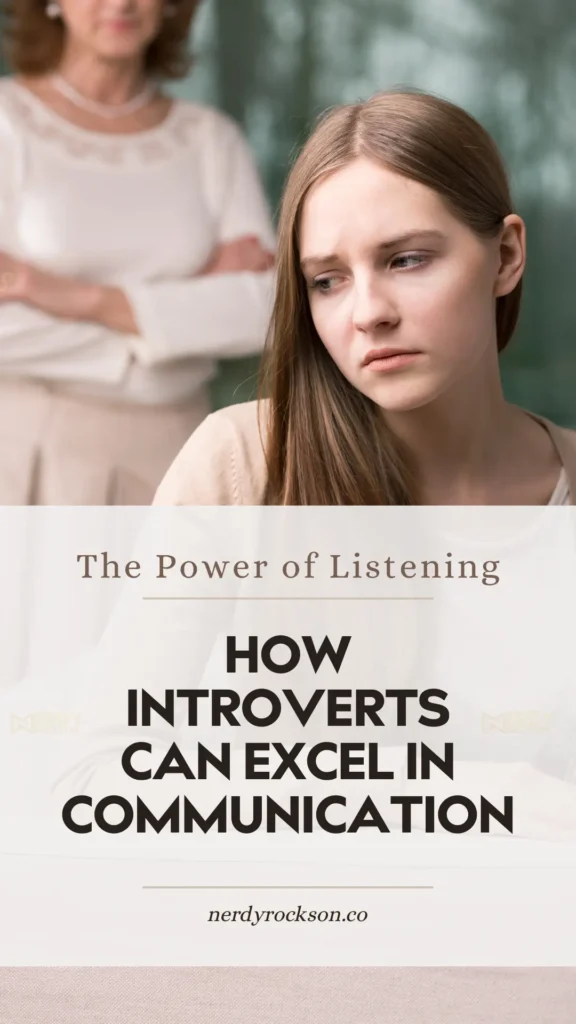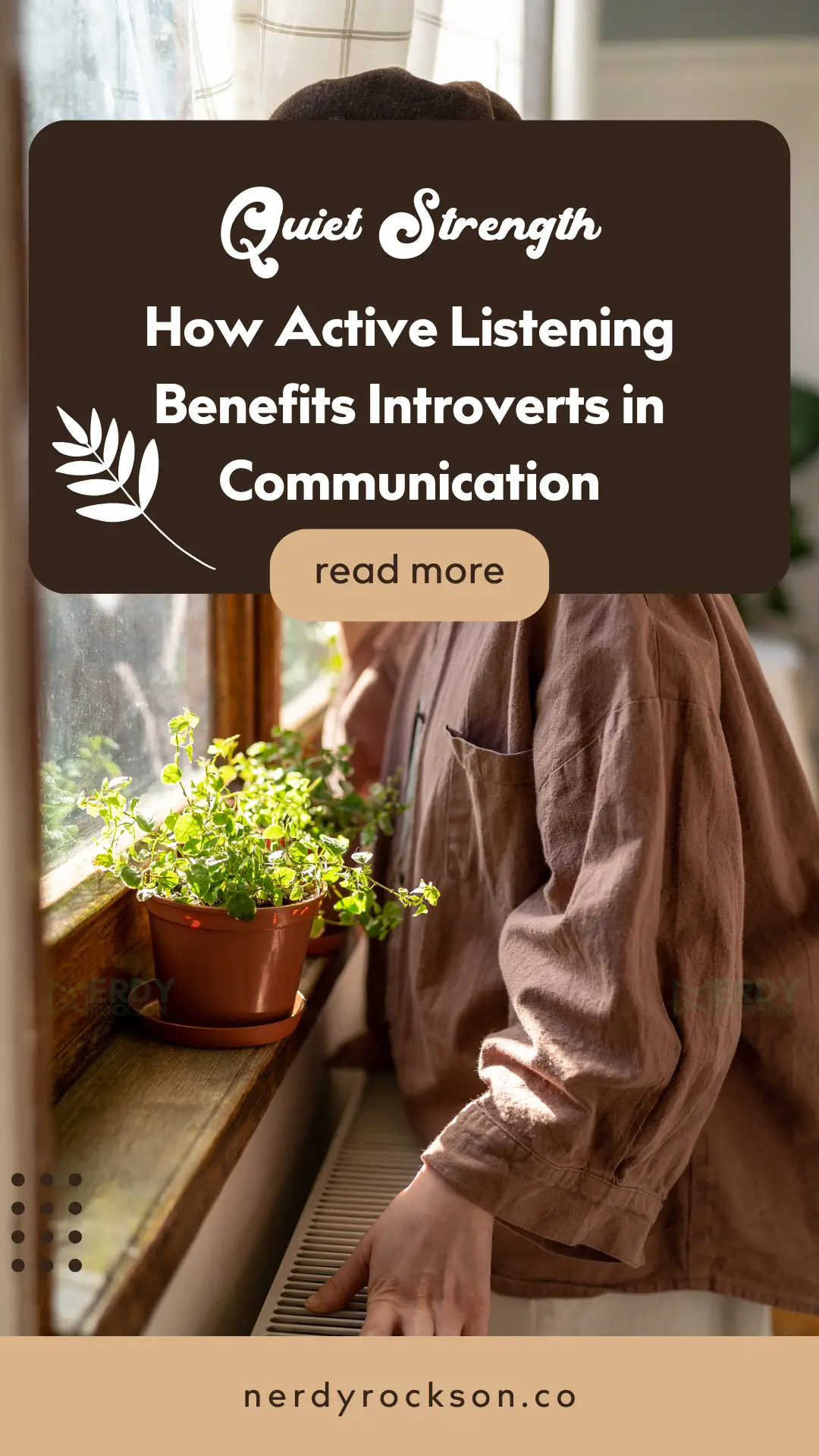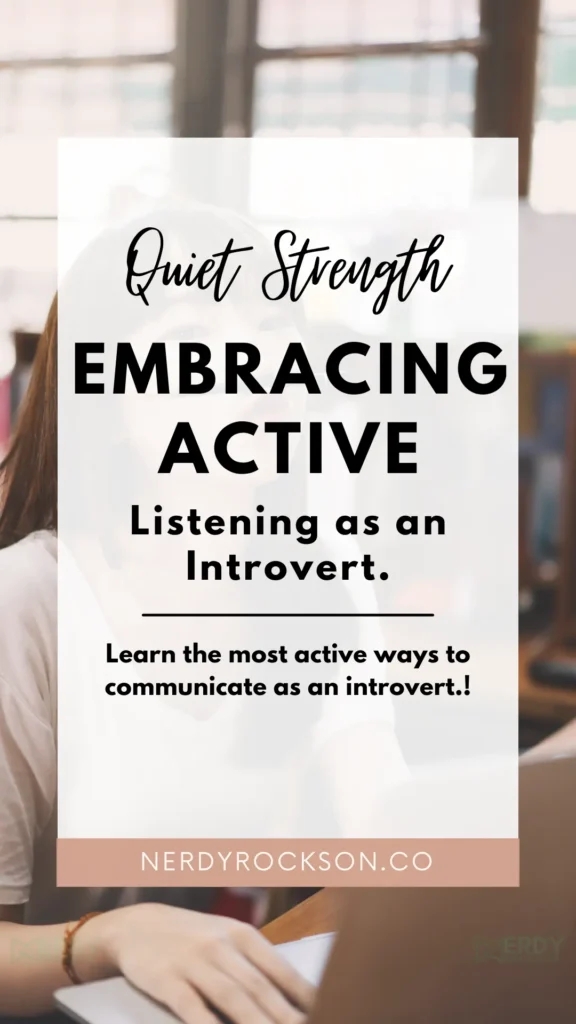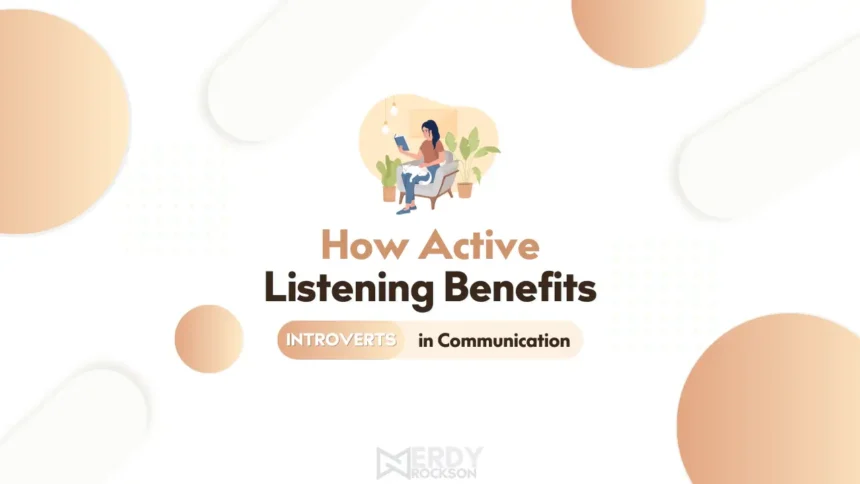Active listening, an underappreciated skill, has the potential to sharpen our communication abilities. However, many people mistake it for merely ‘listening.’ This is a far cry from the truth. According to Mind Tools, active listening is a structured form of listening and responding to others, enhancing mutual understanding. It is eagerly ripe with latent benefits, especially for introverts.
Statistics enrich this wisdom even further. For example, research from Harvard Business Review demonstrates that effective listeners are often perceived as influential leaders. They suggest that active listening helps in developing trust, establishing rapport, and understanding others better – qualities often associated with leadership.
Active listening is not just an activity; it is a quality of presence. And that presence is an amalgam of focus, attention, and respect.
Dianne Schilling
Introverts, with their nuanced observation skills and propensity for deep thought, can wield active listening as a powerful tool. For those introverts seeking to enhance their communication skills, active listening holds tremendous potential. This article serves to emphasise this vital cog of communication and how introverts can leverage it to their advantage.
The Power of Active Listening
Active listening pushes the bounds of routine hearing and urges you to fully engage with the speaker. It’s not just about letting the words wash over you but understanding the message, asking insightful questions, and providing thoughtful feedback. Tapping into this art can open up new channels of communication and make us more effective in personal and professional engagements.
You might think as an introvert, active listening is tough. But here’s the thing: introversion is not a hurdle but a strength. Introverts tend to observe and reflect before they speak, which makes them naturally inclined to this skill. Remarkably, your very tendency to remain quiet in conversations isn’t a drawback—it arms you with the power of active listening.
“Active listening is not just an act but a habit, one that brings you closer to others and fosters meaningful relationships,” says Dr. Scott Johnson, a psychologist and communication expert. Active listeners draw people in, encourage trust, and stimulate more in-depth conversations.
Now, suppose you’re wondering how to tap into this power as an introvert. In that case, the key lies in five fundamental principles: Attending, Understanding, Remembering, Evaluating, and Responding. These principles don’t demand verbal prowess or an outgoing personality—just a genuine interest in comprehending and valuing the speaker’s perspective.
- Attending: Giving your undivided attention to the speaker. It involves not only what is said but how it’s delivered—tone, emotion, and non-verbal cues.
- Understanding: Gaining a solid grasp of the speaker’s message. This involves piecing together their words, feelings, and ideas and thinking from their perspective.
- Remembering: Retaining the information shared. This demonstrates to the speaker that you value their input and reinforces your comprehension of their message.
- Evaluating: Digesting the speaker’s message, considering its validity and significance. This is an internal process, often complemented by observation and introspection—two areas where introverts excel.
- Responding: Provide non-verbal and verbal responses that show you’re engaged in the conversation. This is typically where introverts feel they falter, but remember, your responses don’t need to be lengthy to be impactful.
So, embrace your introversion. Recognise that it equips you uniquely for active listening. Practice these principles consciously, nourish your innate listener, and watch the power of active listening redefine your conversations.
Benefits of Active Listening for Introverts

Engaging wholeheartedly in the act of active listening can work wonders for introverts. Despite common misconceptions, introverts are not necessarily shy or anti-social. Instead, they often flourish in more intimate, thoughtful interactions. Here, active listening comes into play as an effective way for introverts to connect meaningfully with those around them.
Understanding and Empathy
By actively focusing during communication, introverts can gain a deeper understanding of the speaker’s viewpoint. Active listening encourages empathy, an emotional quality that can strengthen relationships and build trust. As an introvert, you have a unique ability to delve into intricate details and unravel the complexities of a given topic. When you use this ability in your conversations, you create an environment of mutual respect and understanding.
Silent Assertiveness
Active listening, remarkably, provides introverts with a platform to assert their presence in conversations without interrupting or dominating the discussion. By responding with thoughtful questions or insightful comments, introverts project their understanding of the topic at hand. This silent assertiveness helps establish introverts as respectful participants of a conversation who add value through attentive understanding.
Reduced Anxiety
Introverts might feel uneasy in unpredictable social encounters due to their preference for quieter, more controlled environments. Active listening can act as a support system in such situations. By focusing on the speaker’s words and body language, introverts can divert their attention away from their anxiety. This helps in creating a sense of calmness and control over the situation, making communication less daunting.
To summarise, active listening aids introverts in strengthening their interpersonal relationships, establishing their presence in conversations, and managing social anxiety. Thus, introverts can turn active listening into a global strength in their communication toolkit.
Overcoming Communication Challenges as an Introvert
Granted, as an introvert, you might find some aspects of communication demanding. However, recognising these challenges presents you with the launching pad to leap towards effective communication. Here, we tabulate some common difficulties introverts face and how to resolve them:
| Communication Challenge | Overcoming Strategy |
|---|---|
| Reluctance to initiate conversations | Find common ground. Begin with topics you’re comfortable with and gradually move into unfamiliar territories. |
| Perceived as aloof or uninterested | Use non-verbal cues like maintaining eye contact, nodding or smiling to show your engagement. |
| Difficulty asserting oneself | Practise articulating your thoughts and feelings. Validate your emotions and have your voice heard. |
| Anxiety in group settings | Prioritise quality over quantity. Value deep, meaningful connections over shallow, numerous contacts. |
Remember, Susan Cain, the author of ‘Quiet: The Power of Introverts in a World That Can’t Stop Talking’, affirms (source), “Introverts think before they act, digest information thoroughly, stay on task longer, give up less easily, and work more accurately.”
How to cultivate Active Listening
Active listening is not a passive action; it requires concentration, effort, and genuine interest in understanding another’s perspective. For introverts, a few techniques can make active listening more intuitive, allowing them to engage more comfortably in conversations and communications. Here are some suggestions:
- Pause before responding: Introverts often prefer to process information before they respond, and that’s not a weakness—it’s perfectly okay. Take your time to digest what you’ve heard before offering any input.
- Silence is golden: Don’t feel pressured to fill every silence in a conversation. It’s okay to be silent at times. Embrace these moments to deeply reflect on what’s been said.
- Ask open-ended questions: This sends a message that you’re genuinely interested in the other person’s viewpoint. It’s also a powerful tool for encouraging the other person to share more details about their thoughts.
- Reflect back: Reiterate or summarise what’s been said to confirm your understanding. This doesn’t have to be repetitive, but rather showing them that you followed and appreciated their points.
- Nonverbal cues: Use your body language to show you’re engaged in the conversation. Make eye contact, nod when you understand, and use facial expressions appropriately to communicate your understanding.
It’s essential to remember that introversion is not a hindrance to effective communication or active listening. In fact, it can be a valuable asset. By focusing inward, introverts can channel their natural propensity for deep thought and careful consideration into their listening skills, making them effective and empathetic communicators.
By mastering the art of active listening, introverts can turn their inherent nature into communication strengths, leading to meaningful interactions, stronger connections, and enriched personal and professional lives.
Role of Active Listening in Personal Growth
Active listening presents a golden opportunity for introverts, enabling them to tap into their innate strengths and further their personal growth. This approach contributes significantly to driving empathy, fostering understanding, enabling constructive criticism, and, ultimately, enhancing the overall communication process.
Think about this: As an introvert, your natural tendency to listen rather than talk can be a powerful tool. By honing this strength into an active listening skill, you can transform the way you interact and the way others perceive you.
- Driving empathy: When you actively listen, you encourage open dialogue. Understanding other persons’ perspectives without the rush to respond cultivates empathy and often leads to deeper connections with others.
- Fostering understanding: True active listening minimises misunderstandings – a gift of inestimable value in every social situation, making your every interaction more fruitful.
- Enabling constructive criticism: Through active listening, you’re better positioned to understand where others are coming from, allowing you to provide feedback constructively. This can provide immense value in professional settings and personal relationships alike.
- Enhancing the overall communication process: Active listening means you’re not only dormant but also intensely involved in the conversation. This involvement can lead to improved communication and tighter bonds with those around you.
Remember: Introverts are not deficient communicators; they just communicate differently.
The real power of active listening lies not only in the immediate benefits of better communication but also in the long-term opportunities for personal growth and self-improvement.
Active listening for an introvert isn’t just about absorbing information; it’s using their natural tendency for quietness and introspection to engage on a more purposeful level. This essence falls in line with one of the key facets of introversion: finding contentment in observation.
Thus, active listening doesn’t just rest in the skills of making commentary, seeking clarification or providing feedback. As an introvert, thrive in your ability to observe, comprehend, and respond thoughtfully rather than reactively—further proving the point that introverts are naturally active listeners at heart.



Building Meaningful Connections with Active Listening
As an introvert, you might perceive communication as a challenge. However, being an excellent listener is a natural forte for introverts. This strength can be leveraged to build meaningful and fulfilling personal and professional relationships. Active listening, when effectively practised, holds the potential to make these connections stronger and more rewarding.
Active listening isn’t just about being quiet while the other person speaks. It’s about truly understanding and empathizing with their point of view, asking thoughtful questions, and giving thoughtful responses when it’s your turn to speak. It’s a two-way street that fosters an environment of trust and respect.
For introverts, often considered to be thoughtful and observant, the practice of active listening can help forge deeper connections with others. This could be a confidant with whom you share your deepest thoughts or a colleague you’re working with on a crucial project.
Remember, developing a genuine connection takes time and patience. With active listening, you can gradually establish trust, respect, and mutual understanding, which are the cornerstones of any meaningful relationship.
Let’s understand how active listening can help you build such meaningful connections:
- Deepening Understanding: Active listening allows you to get to know the speaker on a personal level. You gain an in-depth understanding of their thoughts, feelings, and motivations.
- Building Trust: By demonstrating that you’re truly interested in understanding the speaker’s perspective, you create a space where they feel comfortable opening up. This can significantly enhance mutual trust.
- Improving Conflict Resolution: Active listening is a key element in resolving conflicts. By fully understanding each other’s viewpoints, a compromise becomes easier to achieve.
In the realm of professional interactions, active listening can help you build productive working relationships. Not only does it allow you to understand your colleagues better, but it also encourages collaboration and fosters a positive work environment.
However, remember to be patient. Change doesn’t happen overnight. As you grow into a stronger active listener, you’ll establish deeper, more meaningful connections—one conversation at a time.
Navigating Social Situations with Active Listening
It’s quite common for introverts to find social situations a tad intimidating. Chats at coffee breaks, dinner parties, and even small talk with neighbours can feel daunting. However, there’s an approach to ease these concerns. It’s called active listening, a technique you can use to become better at communicating and connecting with people, even when you naturally tend towards solitude.
Active Listening in Group Conversations
Have you ever felt overwhelmed in group discussions and bedazzled by rapid-fire conversation and a volley of viewpoints? Let active listening be your anchor. Concentrate wholeheartedly on comprehending what the other person is expressing rather than focusing on your thoughts and what you might say next. You’ll find this simple shift in focus can make group conversations much more manageable and engaging.
Breaking Down Barriers with Active Listening
Often, the frequent challenge introverts face is breaking the ice. Initiating a conversation might be anxiety-inducing, but active listening can act as your ally here. By asking open-ended questions and showing genuine interest in the other person’s thoughts and feelings, you can initiate conversations that feel natural and comfortable.
Remember, the essence of active listening is not just about hearing the words; it’s about understanding the true essence of what’s being said.
Chiefnerds
Active Listening: Your Tool for Deeper Connections
Introverts often cherish deep, authentic connections above surface-level interactions. This is where active listening truly shines. By understanding, validating, and empathising with the other person’s perspective, you foster an environment of trust and intimacy, laying the foundation for deeper, more meaningful relationships.
So, for those who are introverted, it’s time to embrace active listening. This powerful tool can not only enhance your communication skills but also elevate your experiences in managing social situations. Here’s to navigating the social landscape confidently!
Overcoming Anxiety and Shyness with Active Listening

Listen up, fellow introverts. Sometimes, the anticipation of entering a conversation or group situation can feel daunting. Your palms may become sweaty, and you might even feel a sense of dread. However, there’s a secret tool that can help you handle these situations with grace—active listening.
Active listening has the potential to alleviate anxiety and shyness by steering the focus away from you and towards the conversation itself. Instead of worrying about what you’re going to say next, active listening encourages you to fully engage with what the other person is saying. This shift in focus helps to decrease anxiety and increase your comfort level during interactions.
The relationship between active listening and diminishing anxiety manifests itself in three main ways:
- Lowering stress: By focusing on understanding others rather than worrying about how you are perceived, active listening can help reduce stress and enable calmer conversations.
- Increasing confidence: Active listening shows that you value others’ thoughts, which, in turn, can boost their esteem for you and, consequently, your self-confidence.
- Improving relationships: Engaging in active listening helps build connections, making future interactions less intimidating and more rewarding.
Beyond reducing anxiety, active listening can also help to overcome shyness. Shyness often manifests as fear of social judgment. However, active listening involves responding and empathising with the speaker, which can help break the ice and reduce the sense of vulnerability associated with shyness.
Let’s look at some examples. Imagine you’re in a group setting, and someone starts to share a detailed story. Instead of thinking about how you should respond or what story of yours could possibly top it, focus on the other person. Let your curiosity lead the way. Ask questions about their story. Show them you’re interested. This type of engagement tends to lead to more organic, less pressurised conversations—a haven for anyone working to overcome shyness.
Indeed, weaving active listening into your social interactions is a conscious effort, but with time and patience, it becomes second nature. Remember, it’s not about perfecting every conversation; it’s about making a conscious effort to be present in each interaction. As you practice, you’ll find anxiety and shyness starting to melt away, replaced by confidence and authentic connections.
How Active Listening Can Transform Your Life
Introversion shouldn’t be perceived as a weakness. Quite the contrary, being an introvert can provide you with unique abilities, one of which is active listening. This incredible skill can help transform your life in countless ways.
Active listening is the act of fully focusing, understanding, responding, and then remembering what is being said to you. It’s not just a natural trait of introverts, but rather, it can be a learned and polished ability. Leveraging this strength can lead to improved relationships, better decisions, and more effective communication.
“It’s not about being silent, but about being present.”
Here is how introverts can use active listening to transform their lives:
- Widening Perspective: As introverts, active listening allows you to gather more information, understand different perspectives, and make more informed decisions.
- Enhancing Relationships: When we actively listen, we make the other person feel valued and appreciated, strengthening our personal and professional relationships.
- Boosting Confidence: The process of understanding the speaker wholly and providing thoughtful responses helps introverts build confidence in their communication abilities.
- Improving Learning: By listening actively, introverts are able to process and retain information better, leading to enhanced learning and performance.
So, the next time you’re in a conversation, tune in, acknowledge, respond, and remember what’s being said. Active listening is not only a communication tool but a fundamental aspect of human connection.
Embrace your introverted nature; it offers you unique opportunities for personal growth. Celebrate your listening abilities, manifest your inner power through it, and see how it transforms your life.
Conclusion
In conclusion, if you’re an introvert, embracing active listening is a powerful tool that can lend strength to your communication abilities. By actively engaging with others, you can overcome shy tendencies, navigate social scenarios confidently, and build meaningful connections. Celebrate your introversion; see it not as a hurdle but as a chance to harness the power of active listening, which can be transformative on both a personal and professional level.
This is not to say that it will always be easy, but with perseverance, every challenge can be transformed into an opportunity for growth and development. Remember, everyone’s communication journey is unique, so focus on your own progress rather than comparison with others.
For further reading and strategies on how to improve active listening skills as an introvert, please see “The Introvert’s Superpower: Listening”, published by Introvert UpThink.









